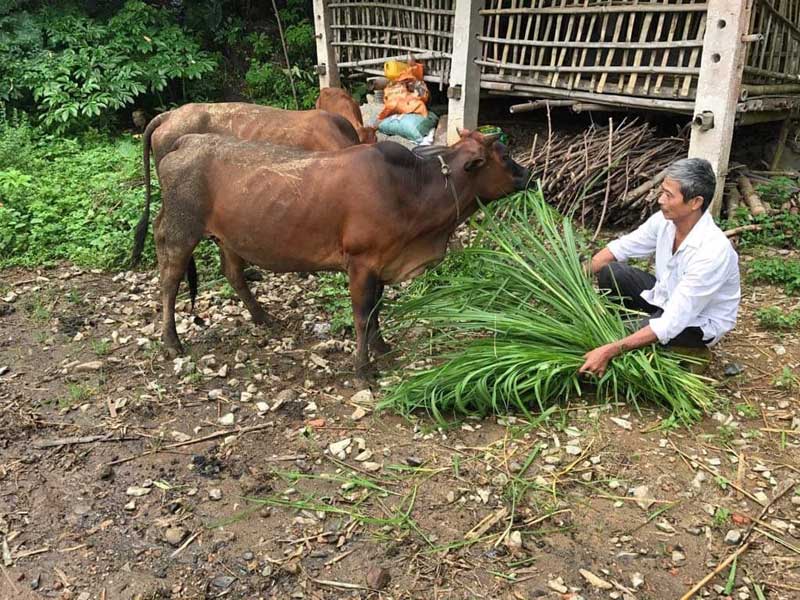
HBO – Over the past time, Luong Son district in the northern mountainous province of Hoa Binh has stepped up agricultural restructuring in combination with new rural area building.
 Farmers in Quyen Chua hamlet, Cao Duong commune, Luong Son district, improve
their income thanks breeding cows for beef.
Farmers in Quyen Chua hamlet, Cao Duong commune, Luong Son district, improve
their income thanks breeding cows for beef.The
project on agricultural restructuring towards higher added values and
sustainable development in Luong Son district by 2020 aims to develop local
agriculture towards mass production with higher productivity, quality and
competitiveness, contributing to improving local people’s living standards,
reducing poverty rate and protecting the environment.
The district’s gross regional domestic product (GRDP) is expected to grow 2.02
percent annually while annual average income per capital in rural areas is set
at over 50 million VND. More than half of communes in the districts are hoped
to fulfil 19 criteria of a new rural area by 2020.
Luong Son has instructed the agricultural and rural area sector to join hand
with relevant ministries and agencies in agricultural restructuring in line
with the district’s socio-economic development strategy and planning, and in
combination with sustainable new rural area building.
The agricultural restructuring must be carried out in accordance with the
market mechanism, while helping ensure basic targets of social welfare for
farmers and consumers, and improve production quality and efficiency.
Mr Nguyen Anh Duc, head of the district’s bureau of agriculture and rural
development, said agricultural restructuring is an important, long-term task
that is closely linked with the national target programme on new rural area
building.
To gain better results, the district has paid attention to developing
collective economic models, forming production and consumption chains, stepping
up scientific-technological application and mechanising production.
As a result, it now has ten new rural communes. Thanks to changed plant
structure and production chains, the district’s income per capita has reached
31 million VND each year and the poverty rate dropped to 1.91 percent.
The Department of Education and Training of Hoa Binh province held a conference on March 18 to review the performance of the "Safe and Happy School" Project and set out tasks for 2025. The project, funded by the Taiwan Fund for Children and Families (TFCF), aims to create a safe, inclusive, and supportive learning environment for students. The event saw the attendance of representatives from the TFCF and 26 beneficiary schools.
With over 70% of their workers being women, trade unions across industrial parks (IPs) in Hoa Binh have been actively safeguarding their legal rights and interests while implementing initiatives to improve their income and well-being.
In recent years, the Hoa Binh provincial General Hospital has continuously innovated itself and improved the quality of medical services to meet the increasing needs of local people. With substantial investments in infrastructure and modern equipment, along with a team of highly qualified doctors and nurses, the hospital has gradually established itself as one of the leading medical units in the Northwestern region and a trusted destination for healthcare for people inside and outside the province.
From mastering the fundamentals of programming to achieving national recognition, the Programming Club of the Le Van Tam Primary School (STAR LVT28) in Hoa Binh city has made remarkable strides in the field of robotics.
The Ho Chi Minh Communist Youth Union Committee and the Vietnam Youth Federation chapter of Hoa Binh province organised a programme on March 12 to launch the "Digital Literacy" movement and an online quiz on the resolutions of the Vietnam Youth Federation congresses at all levels, as well as the Politburo's Resolution No. 57-NQ/TW on breakthroughs in the development of science, technology, innovation, and national digital transformation.
As climate change grows more unpredictable, the development of production forests has become essential - not just for economic growth, but for safeguarding the environment and maintaining ecosystem balance. By boosting local incomes, curbing natural disasters, preventing soil erosion, and protecting water resources, these forests play a crucial role in sustainable development.



 Farmers in Quyen Chua hamlet, Cao Duong commune, Luong Son district, improve
their income thanks breeding cows for beef.
Farmers in Quyen Chua hamlet, Cao Duong commune, Luong Son district, improve
their income thanks breeding cows for beef.